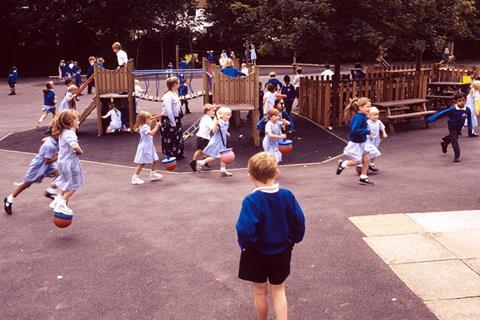Jo Rowe uses a ’coaching’ approach in the school and her home that is helping children thrive

Playground duty. In the space of that 20 minutes of playtime, as a teacher, you become a cheerleader, judge, executioner (of privileges!), nurse, negotiator and instructor. My least favourite of these roles is the judge. Kids run up to you with their grievances and tell tales on their friends. You never know the full story, and yet, you are supposed to intervene and make a judgement of fault. An impossible task.
Last term, I made a spur of the moment decision whilst on playground duty. It came out of my mouth because it so often comes out of my mouth at home in parenting. It is a phrase I use so often with my four kids that in the moment, on the frosty Wednesday morning, it was on the tip of my tongue before I could stop it!
I said, “Oh no, What do you think you should do?”
You see, basketball was being played in year six. Never a good thing because the rules seem very loose and from the outside of this, supposedly non-contact game, it could easily be mistaken for rugby. The ball is often confiscated. On this particular Wednesday, one of the boys came up with a list of grievances against another boy. After he had delivered me his speech of offences he looked at me expectantly and “Oh no, what do you think you should do?” had popped out of my mouth before I realised.
He looked at me with confusion. “What do you mean?”
I clarified. “It seems to me that there is a problem here with communication. What do you think you should do?”
Again, a total look of bafflement. He was expecting me to intervene; give a little lecture to the other boy about playing fair, hand him the ball and let them go again. But I didn’t. I stood there looking at him, patiently, waiting.
“I don’t know!” he mumbled, looking at his feet.
“Ok, what is it you want me to do?”
Silence.
He answered me eventually. “ I want you to talk to him.”
I asked him if that would help; a simple shrug of the shoulders and a shake of the head. No, it probably wouldn’t help. Not really long term. So I tried again.
“What is it that you most want to come out of your game of basketball?” He told me that he wanted a good game, that he wanted the rules to remain consistent, that he wanted to tell the boy that he didn’t like being shoved. Brilliant! We were getting somewhere. He agreed that it would probably be best if he communicated these things himself. I asked how I could help.
In the end, I went with him, for moral support, as he had a tricky conversation with the other boy. I didn’t say anything. He had worked it out himself. The result was tighter agreed-on rules and an understanding that as soon as it got rough the game would be stopped.
I felt so proud!
Since that day, this has become my regular practice. Rather than stepping in straight away with tellings off and judgement, I ask my two questions: What do you think you should do? And What would you like me to do? I have been amazed at some of these children. There have been some truly fantastic solutions and conversations. I have been able to watch as situations are handled brilliantly by the kids themselves.
Empowering children with two questions
The reason that I use these two questions regularly at home is because, as a parent, my number one job (after making them feel loved!) is to teach my kids how to think clearly, and make empowered, thought-through, wise decisions. If I can enable this in my children, I literally equip them in everything!
As humans, we are often wired to take the path of least resistance. Kids would like to hand their problems to us so that we can fix them; it’s easier that way. And often, if we are honest, those of us who are parents, or who work with kids, sometimes it is easier and quicker that way too! And probably, if we could have another adult on hand who offered to fix our problems, we would probably take them up on it. It would be easier and quicker and a lot less stressful if we could hand-off our problems.
However, if we are forever rescuing and fixing our kids’ problems, we are actually doing them a disservice, even though it feels like the most loving thing to do. You see, when I wade in with my judgement and consequences on the playground, I might have cleared up a moment but I haven’t taught the kids to deal with future moments! They aren’t any more equipped to deal with relationship breakdown. All I have taught them is that they need me. But my two questions are more coaching questions. By asking the kids what they think they should do, I am teaching them to engage their brains and think through the problem. That simple question shows them that I think that they are able to come up with a solution. I trust them. And my second question of “What would you like me to do?” shows them that I am in it with them, I am there for support and help, but that I am not going to simply wade in and rescue them without thought.
How hard do you need to work?
Danny Silk, my parenting go-to author, has a phrase that shapes my parenting. “I’m not going to work harder on your problem than you are!” I have borrowed this and I must say it several times a week, both at school and home. IT is another way of gently teaching my kids, and the kids at school, that they need to take responsibility for their work, their messes, their mistakes. I am there to work alongside, to help and coach, but I am not going to take the major share.
I have discovered though that these two questions DO NOT work without a very healthy dose of compassion. If I bark these questions or deliver them with sarcasm; we both loose. The questions can’t be a weapon used to show we aren’t getting involved. Kids know when they are being fobbed off. But when we use compassion and are genuinely concerned that they are uncomfortable or struggling, then kids know that we are in their corner and that gives them the confidence to think and then act.
Thinking and THEN acting. That’s the aim. We have all observed, or experienced, those kids who act before they have thought about anything. They are the impulsive kids who get themselves into trouble and cause arguments without meaning to. They are the kids that yell loudly, “Watch this!” and usually end up in the Emergency Department. My two questions (what do you think you should do? And What would you like me to do?) encourage kids to think first and then act!
And on the other end of the scale, we also know those kids who are anxious and shy who think much too much and for far too long. The kids who worry about each action, so end up not doing anything. My two questions encourage action. It offers support and backup which will give kids confidence to step out and act on their thoughts.
In saying this, though, there are times where we need to step in as the adult. Some kids in my class with additional needs might be so startled by the question that it would be counter productive. As with all parenting strategies and ideas we have to take the parts that will work with the kids we have our work with. With my kids with additional needs I start this question at a much lower level, like when they announce that their pen has run out, I gently ask them the questions.
I am excited to see how the strategy that I have used for so long at home, continues to play out at school. So far I have seen a really positive change in the quality of communication between the kids and the ability to work out problems themselves. I hope that this will be a lesson that they take out into secondary school and beyond. Maybe even asking those two little questions of their own children one day?




























